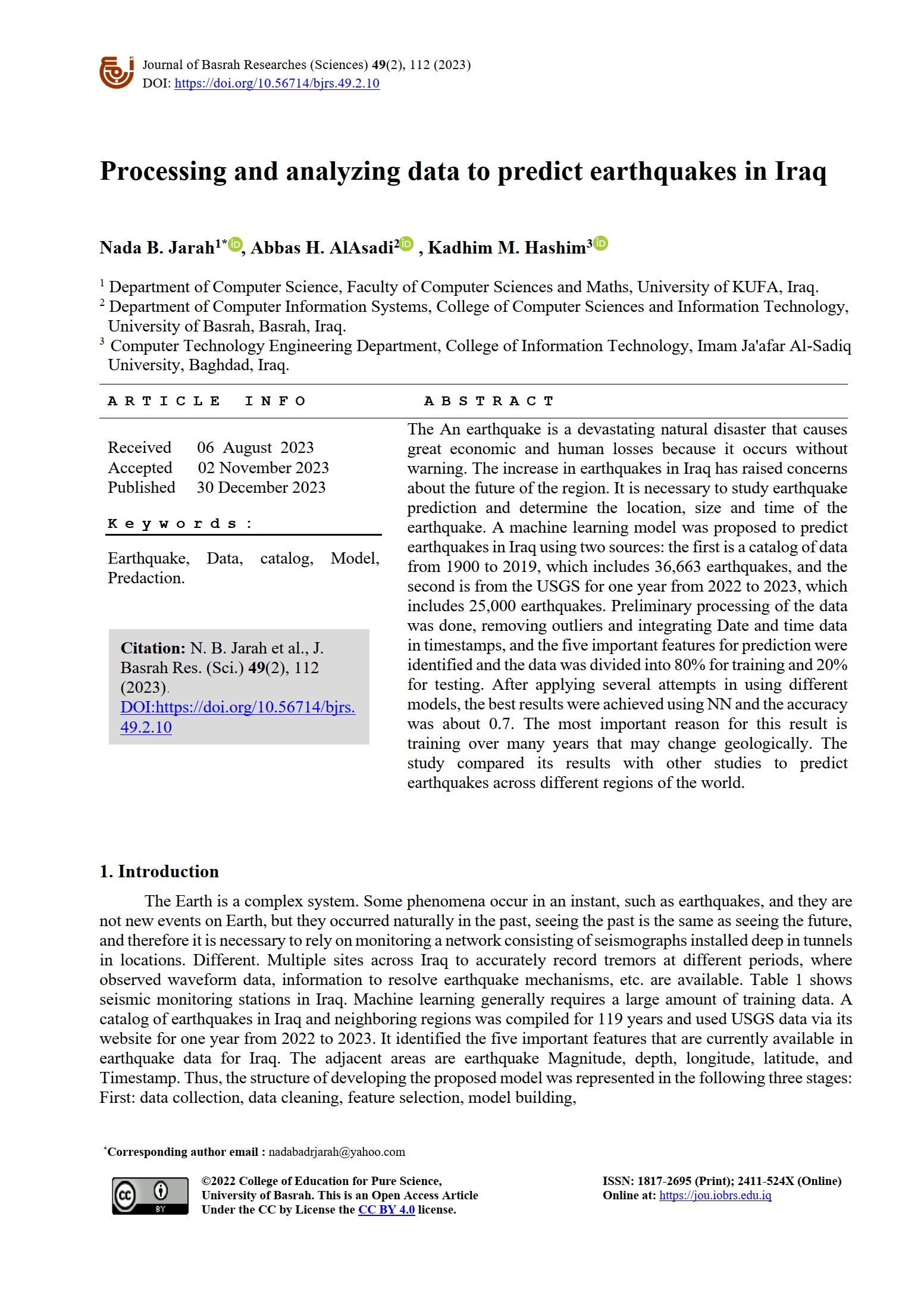Processing and analyzing data to predict earthquakes in Iraq
DOI:
https://doi.org/10.56714/bjrs.49.2.10Keywords:
Earthquake, Data, catalog, Model, PredactionAbstract
The An earthquake is a devastating natural disaster that causes great economic and human losses because it occurs without warning. The increase in earthquakes in Iraq has raised concerns about the future of the region. It is necessary to study earthquake prediction and determine the location, size and time of the earthquake. A machine learning model was proposed to predict earthquakes in Iraq using two sources: the first is a catalog of data from 1900 to 2019, which includes 36,663 earthquakes, and the second is from the USGS for one year from 2022 to 2023, which includes 25,000 earthquakes. Preliminary processing of the data was done, removing outliers and integrating Date and time data in timestamps, and the five important features for prediction were identified and the data was divided into 80% for training and 20% for testing. After applying several attempts in using different models, the best results were achieved using NN and the accuracy was about 0.7. The most important reason for this result is training over many years that may change geologically. The study compared its results with other studies to predict earthquakes across different regions of the world
Downloads
References
B. R-Leduc, C. Hulbert, N. Lubbers, K. Barros, C. J. Humphreys, P. A. Johnson, Geophysical Research Letters, 44(18), 9276 (2017). Doi: https://doi.org/10.1002/2017GL074677
G.A. Corte's, A.M. Esteban, X. Shang, F.M. Alvarez, Computers & Geosciences, 115, 198 (2019). Doi: https://doi.org/10.1016/j.cageo
R. Mallouhy, C. A. Jaoude, C. Guyeux, A. Makhoul International Conference on Information and Communication Technologies for Disaster (2019). Doi: https://doi.org/10.1109/ICT-DM47966.2019.9032983
P. Bangar, D. Gupta, S. Gaikwad, B. Marekar J. Patil, International Journal of Recent Technology and Engineering (IJRTE) 8(6), 4684 (2020). Doi: https://doi.org/10.35940/ijrte.E9110.018620
A. Joshi , S. Kale , S. Chandel , D. K. Pal, Current Journal of Applied Science and Technology 7(4), 396 (2015). Doi: https://doi.org/10.9734/BJAST/2015/14975
S.Jamshed, J Basic Clin Pharm. 5(4), 87 (2014). Doi: https://doi.org/10.4103/0976-0105.141942
G.Bowen, Qualitative Research Journal 9(2), 27. Doi: https://doi.org/10.3316/QRJ0902027
S. Dash, S.K.Shakyawar, M. Sharama, S. Kaushik, Journal of Big Data 6(1), 54 (2019). Doi: https://doi.org/10.1186/s40537-019-0217-0
T. Onur, R. Gök, W. Abdulnaby, H. Mahdi, N. M. S. Numan, H. Al-Shukri, Ammar M. Shakir, H. K. Chlaib, Taher H. Ameen, Najah A. Abd, Seismological Research Letters 88(3), 798 (2017). Doi: https://doi.org/10.1785/0220160078
H. J. Mohammed S. H. Faraj, Iraqi Geological Journal 39–49(2), 104 (2016). Doi: https://doi.org/10.46717/igj.39-49.2.8Ms-2016-12-31
W. Abdulnaby ,T.Onur ,R.Gok, A.M. Shakir, H. Mahdi, H. Al-Shukri, N.S. Numan, H.K.Chlaib, T.H. Ameen , A.Ramthan, Journal of Seismology 24(3), 2020. Doi: https://doi.org/10.1007/s10950-020-09919-2
M. A. Salam , L. Ibrahim and D. S Abdelminaam , Article Published in International Journal of Advanced Computer Science and Applications (IJACSA), 12(5), 2021. Doi: https://doi.org/10.14569/IJACSA.2021.0120578
M. A. Priestley, F. O'Donnell, E. Simperl, ACM Journal of Data and Information Quality, 2023. Doi:https://doi.org/10.1145/3592616
F. Ridzuan, W. M. Zainon, Procedia Computer Science 161, 731 (2019). Doi:https://doi.org/10.1016/j.procs.2019.11.177
A. Palanivinayagam, R. Damaševičius, Information 14(2), 2023.Doi: https://doi.org/10.3390/info14020092
D. Cousineau, S. Chartier, International Journal of Psychological Research 3(1).Doi: https://doi.org/10.21500/20112084.844
P. J. M. Ali, R.H. Faraj, Machine Learning Technical Reports 1(1), 1 (2014).Doi: https://doi.org/10.13140/RG.2.2.28948.04489
H.Kang, Korean Journal of Anesthesiology 64(5), 402 (2013).Doi: https://doi.org/10.4097/kjae.2013.64.5.402
J.Y.Chan,S.M. Leow,K.T. Bea,W.K. Cheng, S.W.Phoong, Z.W.Hong, Y.L.Chen, Mathematics 10(8), (2022).Doi: https://doi.org/10.3390/math10081283
G. Sathwik, V.S. Patil, S. Br, S. Vishesh, J. Yatish, S. Soham, International Journal of Advanced Research in Computer and Communication Engineering(IJARCCE) 11(11), 110 (2022).Doi: https://doi.org/10.17148
K. Asim, A. Idris, T. Iqbal, F. Álvarez, PloS one 13(7), (2018), Doi:https://doi.org/10.1371/journal.pone.0199004
S. Karimzadeh, M. Matsuoka, J.Kuang, L. Ge, ISPRS International Journal of Geo-Information 8 (10), (2019).Doi:https://doi.org/10.3390/ijgi8100462

Downloads
Published
Issue
Section
License
Copyright (c) 2023 J. Basrah Res. (Sci.)

This work is licensed under a Creative Commons Attribution 4.0 International License.
This journal is licensed under the Creative Commons Attribution 4.0 International License (CC BY 4.0).
Under this license, users are permitted to read, download, copy, distribute, print, search, link to the full texts of articles, and create derivative works, including for commercial purposes, provided that appropriate credit is given to the original author(s) and the source.
Authors retain the copyright of their published work, while granting the Journal of Basrah Researches Sciences (JBRS) the right of first publication. Proper attribution must include the article title, author name(s), journal name, DOI, and a link to the Creative Commons license.







